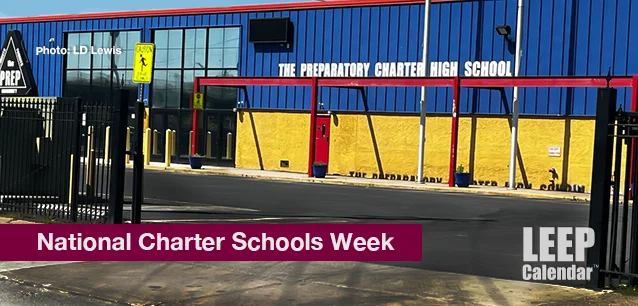 AD
AD
Today is: December 22
Scroll to explore events active on this date.
Additional Events on LEEP
LEEP INK FEATURES

2025 is the Year of...
21 Themes and 'Year of' Events for 2025 PART ONE, THE FIRST 12 Every year, various organizations announce the theme for the year. These themes can focus on causes, such as aesthetics and color tre...

Nuanced November 2024
November is the start of the holiday season in many parts of the world. It is a time for family, football, food, shopping and decorating, particularly in the Christian and Jewish world, leading to Christmas and...

December's Gift
Events in December 2024. Well, we made it to December. December is the holiday season, particularly in Western nations, where Christianity and Judaism are the faiths most common in the nation's past. ...
About National Charter Schools Week
United States
Ends: May 18, 2024
DESCRIPTION:
National Charter Schools Week brings students, parents, teachers, and communities together to celebrate charter schools.
Charter schools appeared in the United States in 1991 due to the state of Minnesota passing legislation to allow tax-payer-funded schools that could operate foreign of various regulations in exchange for increased accountability and elevated student achievement.
The idea behind charter schools originates in the privatization movement, which believes government-run institutions are inefficient. Ideally, charter schools give educators more flexibility and autonomy to innovate and experiment with different teaching methods. Independent organizations, including nonprofit and for-profit companies, are paid by tax dollars to administer charter schools.
Charter schools have been controversial since their inception, with critics arguing that they drain resources from government-run public schools and exacerbate inequalities by cherry-picking students and families. Supporters point to their success in improving student achievement and offering innovative approaches to education. Both sides have good arguments, successes, and failures.
The US government states that 74-94% of students who started ninth grade graduated from high school in 2019-2020. Arizona had the lowest percentage; Iowa, Kentucky, and Texas had the highest, with over 21 states averaging over 90%, regardless of public, private, or charter. In poorer districts like Philadelphia, charter schools graduate more students within four years than public schools. In wealthy suburbs, there is little difference. Charter schools can accept or reject students. Government-run public schools cannot.
Overall, no definitive evidence points to charter schools as a better quality system than government-run public schools. Location, tax base, student body, local economic conditions, teaching staff, and other factors impact both types of schools and lead to good and bad results within each system. For parents navigating education for their children, judge quality on a school-by-school basis, not on its purpose (public education, private or charter for-profit/nonprofit). Good and bad examples can be found in each system.
This event began in 2010.
VIDEOS
Currently, this event does not have supporting videos.
SUPPORTING DOCUMENTS
Currently, this event does not have supporting documents.
ADDITIONAL IMAGES
Currently, this event does not have supporting images.
Where would you like to go now?
 AD
AD


/footer-logo.svg)
